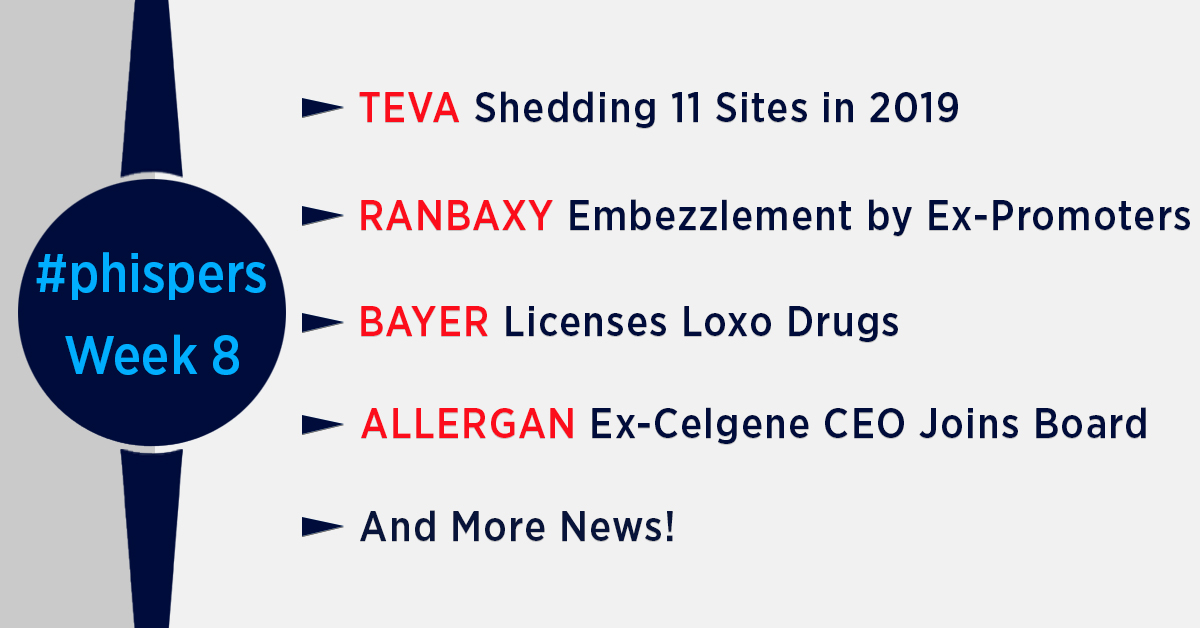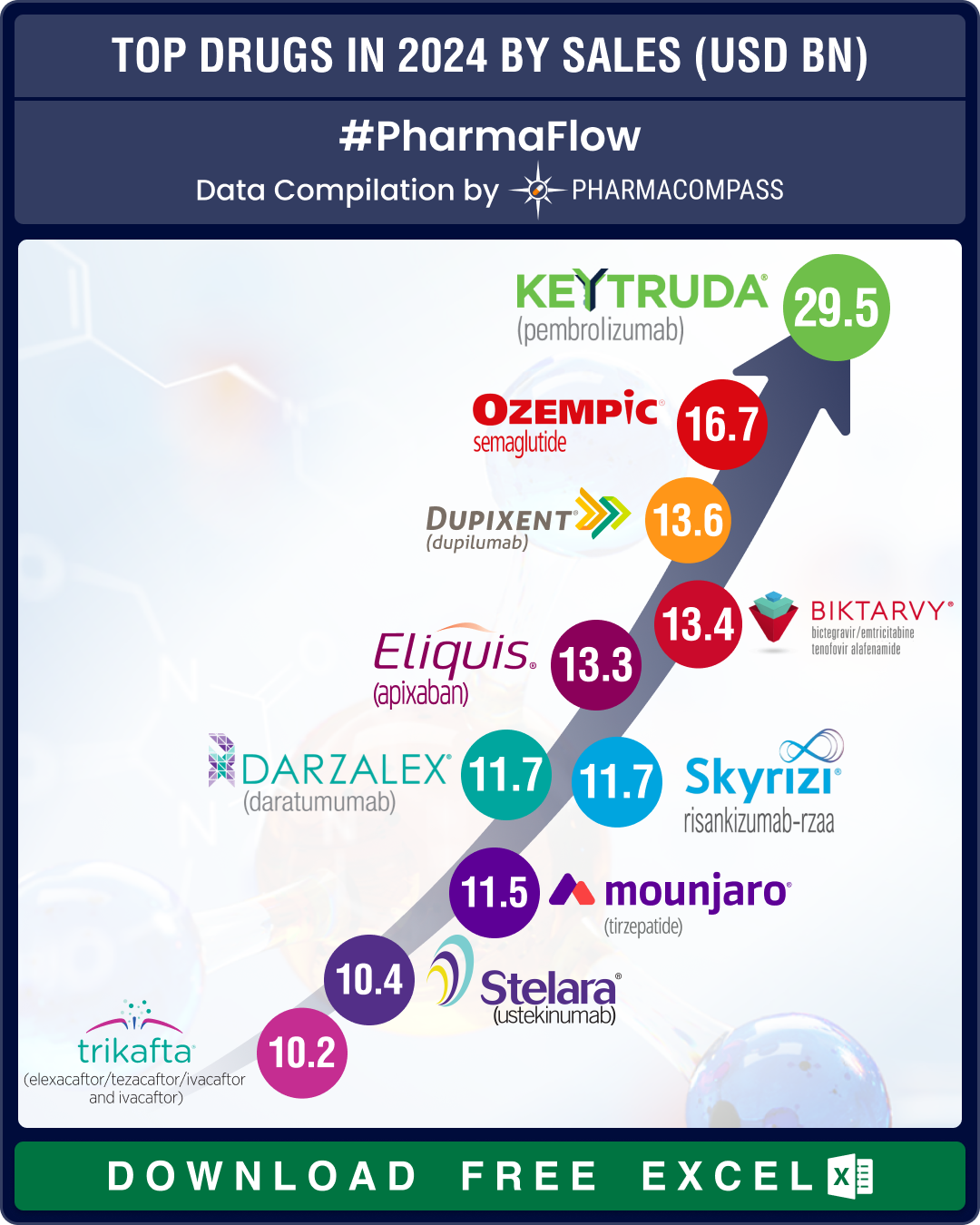
By PharmaCompass
2019-02-21
Impressions: 3050
This week, Phispers brings you news about Israeli generic drug giant Teva, as it plans to close or divest 11 manufacturing sites in 2019 to reduce its cost and debt burden.
India’s Serious Fraud Investigation Office has said the alleged funds diversion at Fortis Healthcare by the erstwhile promoters of Ranbaxy — the Singh brothers — could add up to more than US$ 282 million. Elder brother Malvinder has filed a criminal complaint against Shivinder for siphoning off funds along with a spiritual guru, and for threatening to kill him.
Meanwhile, Bayer exercised its right to gain exclusive licensing right for the global development and commercialization of Loxo’s approved drugs — Vitrakvi and Loxo-195. And hedge fund Appaloosa lashed out at Allergan, post appointment of ex-Celgene CEO on its board.
Teva to shed 11 sites in 2019; to turn to the high-priced biotech market for growth
Beleaguered generic drug giant Teva plans to close or divest 11 manufacturing sites this year, four more than what it had shuttered in 2018.
Back in 2015, Teva’s decision to buy Allergan’s Actavis unit pushed it into heavy debt. It also proved to be a bad time for generic drugs, as the market turned southwards. The Israeli drugmaker then brought in Kåre Schultz as its CEO in late 2017 with a mission to revitalize Teva. In January last year, Schultz had announced plans to close or divest between 20 and 25 plants in 2018 and 2019, with the company planning to significantly reduce its manufacturing footprint.
Even with 11 closures planned for 2019, Teva appears to be slightly behind that target. However, the company’s broader restructuring efforts are progressing well. In 2018, the company reduced its expenses by US$ 2.2 billion and hopes to cut another US$ 3 billion in expenses this year.
Teva has also launched a major restructuring that’s trimmed more than 10,000 jobs from the company’s workforce and cut back Teva’s spending on production of its medicines and on operations. Part of those job cuts have come by reducing the number of manufacturing plants Teva operates.
Meanwhile, Teva also plans to turn to high-priced biotech medications in an effort to jumpstart growth. Teva said it will continue to make generic drugs but will begin to shift more of its research and development focus to innovative biologics and biosimilar drugs, which only make up a small portion of its revenue now. The drugmaker said it envisions biologics making up about half of its sales in the future.
Biologic drugs use living cells to target diseases and ailments. Biosimilars are essentially a copycat version of the biologic drug. The market is expected to grow exponentially by 2025.
The company also conceded during the its fourth-quarter earnings report that 2019 would be an even tougher year than analyst expect, since the company’s blockbuster multiple sclerosis drug Copaxone is losing ground to generic competition. Besides, the company’s newer drugs aren’t taking off fast enough to make up for the loss.
The company forecasts 2019 revenues between US$ 17 billion and US$ 17.4 billion, missing consensus forecasts of more than US$ 18 billion.
Embezzlement by ex-Ranbaxy promoters pegged at US$ 282 million; Malvinder files criminal
case
The case involving the Singh brothers (Malvinder and Shivinder Singh), former promoters of Ranbaxy Laboratories, has turned murkier as India’s Serious Fraud Investigation Office (SFIO) said the alleged funds diversion at Fortis Healthcare (another group company they promoted) could add up to more than US$ 282 million (₹20 billion).
These facts emerged from the complaint filed by Malvinder Singh with the Economic Offenses Wing in Delhi and from the findings of SFIO. Malvinder has also alleged that Shivinder, the spiritual head of the Radha Soami Satsang Gurinder Singh Dhillon and others have also threatened to kill him.
According to Malvinder, Dhillon has threatened him that if he does not agree to Dhillon’s demands, he would be eliminated by persons from the Satsang. Malvinder says he has recordings of death threats to sign agreement absolving Baba.
The Securities and Exchange Board of India (SEBI) also suspects the total size of the fraud could be much higher than the US$ 56.75 million (₹4 billion) it originally estimated.
SEBI has already passed an order against Fortis to recover US$ 70.41 million (₹5 billion) from the Singh brothers for funds diverted to the promoter and promoter-related entities in December.
The compliant points to a series of transactions between RHC Holding Private Limited, the holding company promoted by the brothers wherein RHC extended loans worth US$ 772.66 million (₹54.82 billion) to members of the Dhillon family, their associates or entities controlled by them.
In the complaint, Malvinder claims Shivinder connived with Dhillon to sell these firms to RHC, thus putting more strain on the holding company. The companies were acquired without any legal due diligence, execution of agreements and any check on their businesses, he added.
The twist in the tale came when Dhillon sought to discharge himself from the said liabilities, asking the Singh brothers to sign a family settlement that would encompass no legal proceedings or criminality in any circumstance against him. According to the proposed settlement, Shivinder was offered a position to head the Radha Soami Satsang Beas sect. In return, the Singh brothers were to write off these loans as bad debt.
While Shivinder agreed to the deal, Malvinder did not, the latter said in the complaint. A report published in Mint says Shivinder repeatedly reached out Dhillon to “resolve" financial matters.
Bayer gains licensing rights on two Loxo drugs; makes headway in prostrate cancer drug
Following Eli Lilly’s US$ 8 billion acquisition of Loxo Oncology last month, Bayer has exercised its right to gain exclusive licensing rights for the global development and commercialization of Loxo Oncology’s TRK inhibitors — Vitrakvi and BAY 2731964 (Loxo-195).
Both Vitrakvi and BAY 2731954 are being developed globally for the treatment of adult and pediatric patients with advanced solid tumors harboring neurotrophic receptor tyrosine kinase (NTRK) gene fusions.
Bayer has exercised this option under a change-in-control clause in the collaboration agreement with Loxo to obtain the exclusive licensing rights for the global development and commercialization of these two drugs.
In November 2017, Bayer and Loxo Oncology entered into a global collaboration for the joint development and commercialization of Vitrakvi and BAY 2731954. Following the change of control, Bayer will be solely responsible for the global development and commercialization of both Vitrakvi and BAY 2731954.
As a result of this exercise, the joint co-promotion agreement in the US between Bayer and Loxo Oncology is being converted to full commercialization in the US by Bayer.
Bayer and Loxo gained accelerated FDA approval for Vitrakvi last November as a “tumor-agnostic” therapy to treat patients with tumors with NTRK gene fusion. LOXO-195 is designed as a follow-on therapy for patients who’ve grown resistant to Vitrakvi or any other initial TRK therapy.
Meanwhile, according to Leerink Partners, the projected peak sales for Vitrakvi is US$ 700 million, whereas for Loxo-195 it is US$ 375 million.
Bayer-Orion announce promising results on prostate cancer collaboration: Bayer and partner Orion have released numbers that show their drug — darolutamide — cut the risk of metastasis or death by 59 percent in a late-stage trial in patients with non-metastatic castration-resistant prostate cancer (nmCRPC).
The companies first reported the drug had met the main goal in the ARAMIS trial last October. The trial tested darolutamide against a placebo in more than 1,500 patients with nmCRPC that were already on standard-of-care androgen deprivation therapy and were at high risk of the disease spreading.
Allergan faces flak from key shareholder post appointment of ex-Celgene CEO to its board
On Tuesday, Allergan Plc announced that Robert J. Hugin, former CEO and chairman of Celgene Corporation, has been appointed to Allergan’s Board of Directors, effective immediately. Allergan also called for an eventual division of the chairman and CEO roles at the company. At present, Brent Saunders is the chairman and CEO of Allergen.
However, post this announcement, hedge fund Appaloosa LP posted a letter bashing Allergan’s move. Appaloosa even went on the extent of saying that it would be better for Allergan to go ahead and explore other options, like a sale of the company.
Appaloosa prodded the drugmaker for numerous shortcomings — from billions in write-downs, embarrassing legal maneuvers (such as the Mohawk patent gambit), big paydays and a seriously deflated stock price.
The Appaloosa letter said: “Your announcement today that you will separate the roles of Chairman and CEO at some vague future date falls short of improved governance and once again lays bare your reluctance to hold management accountable for its dismal performance.”
In response to Appaloosa’s letter, Allergan said: “While we appreciate the input of Appaloosa as we do all of our shareholders, we strongly disagree that an immediate separation of the CEO and Chair positions is warranted. Implementing a leadership change in the manner Appaloosa is recommending would be highly disruptive to the Company and diminish Mr Saunders’ ability to continue to execute Allergan's strategy to create a world-class global biopharmaceutical business and develop the Company's promising pipeline. In contrast, the shareholder proposal that our Board supports minimizes disruption and allows for the separation of the Chair and CEO positions with the next leadership change, as these resolutions typically provide.”
The PharmaCompass Newsletter – Sign Up, Stay Ahead
Feedback, help us to improve. Click here
Image Credit : #Phisper Infographic by SCORR MARKETING & PharmaCompass is licensed under CC BY 2.0
“ The article is based on the information available in public and which the author believes to be true. The author is not disseminating any information, which the author believes or knows, is confidential or in conflict with the privacy of any person. The views expressed or information supplied through this article is mere opinion and observation of the author. The author does not intend to defame, insult or, cause loss or damage to anyone, in any manner, through this article.”








